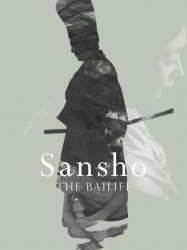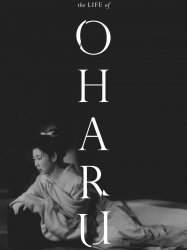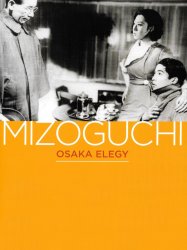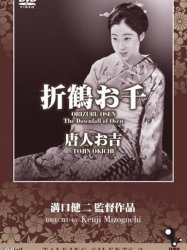The Story of the Last Chrysanthemum is a japonais film of genre Drama directed by Kenji Mizoguchi with Yōko Umemura
The Story of the Last Chrysanthemum (1939)
Zangiku monogatari

If you like this film, let us know!
- Infos
- Casting
- Technical infos
- Photos
- Videos
- Film quotes
- Characters
- Music
- Awards
The Story of the Last Chrysanthemums (残菊物語, Zangiku monogatari), also translated as The Story of the Late Chrysanthemums, is a 1939 Japanese film directed by Kenji Mizoguchi.
Many regard the film as Mizoguchi's greatest pre-war achievement, praising its long takes and mise-en-scène composition.
Synopsis
The film is set in Japan in 1885. Kikunosuke Onoe, played in his movie debut by the stage actor Shotaro Hanayagi, is the adoptive son of a famous Kabuki actor, who is training to succeed his father in an illustrious career. While hypocritically praising Onoe's acting to his face, the rest of his father's troupe deride him behind his back. Otoku (Kakuko Mori), the young wet-nurse of Onoe's adoptive father's infant son, is the only one frank enough to disclose his artistic shortcomings and urge him to improve himself. When Otoku is dismissed by Onoe's family for her closeness to the young master, with its potential for scandal, Onoe is outraged and leaves Tokyo to hone his art away from his father, much to the latter's wrath.Actors

Yōko Umemura
(Osata)

Nobuko Fushimi
(Geisha Eiryu)
Comments
Leave comment :
Suggestions of similar film to The Story of the Last Chrysanthemum
There are 3 films with the same actors, 36 films with the same director, 68098 with the same cinematographic genres (including 125 with exactly the same 3 genres than The Story of the Last Chrysanthemum), 4182 films with the same themes (including 1883 films with the same 2 themes than The Story of the Last Chrysanthemum), to have finally 70 suggestions of similar films.If you liked The Story of the Last Chrysanthemum, you will probably like those similar films :

The Crucified Lovers (1954)
, 1h42Directed by Kenji Mizoguchi
Origin Japon
Genres Drama, Romance
Themes Seafaring films, Sports films, Transport films, Martial arts films
Actors Kazuo Hasegawa, Kyōko Kagawa, Ichirō Sugai (菅井一郎), Eitarō Shindō, Eitarō Ozawa, Yōko Minamida
Rating79%





Ishun (Shindo) is a wealthy but miserly scroll-maker in Kyoto, especially regarding his younger wife Osan (Kagawa), who was from an impoverished family, and married Ishun for money.

The 47 Ronin (1941)
, 3h43Directed by Kenji Mizoguchi
Origin Japon
Genres Drama, Historical
Themes Seafaring films, Sports films, Théâtre, Transport films, Martial arts films, Samurai films, Films based on plays
Actors Mieko Takamine, Daisuke Katō, Isamu Kosugi, Masao Shimizu, Utaemon Ichikawa, Mitsuko Miura
Rating71%





Après l'injuste condamnation à se faire hara-kiri infligée à un jeune samouraï, quarante-sept de ses compagnons le vengent en se faisant à leur tour hara-kiri sur sa tombe.

Utamaro and His Five Women (1946)
, 1h35Directed by Kenji Mizoguchi
Origin Japon
Genres Drama
Themes Seafaring films, Peinture, Sports films, Transport films, Martial arts films
Actors Kinuyo Tanaka, Bandō Mitsugorō VIII, Hiroko Kawasaki, Toshiko Iizuka
Rating69%





The story is set in Edo (now Tōkyō) in Japan. The film starts with a parade of samurai and their concubines (oiran, distinguished by their high shoes) along an avenue of cherry trees. Koide, called Seinosuke by his woman (Kotaro Bando), an artist/samurai apprenticed to a Kanō master, leaves the parade and visits a print shop where he sees a woodcut print by Utamaro that boasts of ukiyo-e 's superiority to the official style. Enraged, he goes to a tea-house to find Tsutaya Jūzaburō, the owner of the print shop, to express his displeasure. Word is leaked to Utamaro to avoid the tea-shop, but instead he goes there directly to investigate. Koide then challenges him to a duel. Utamaro counter-challenges him with a different kind of duel––a painting contest.

Taira Clan Saga (1955)
, 1h48Directed by Kenji Mizoguchi
Origin Japon
Genres Drama, Adventure, Historical
Themes Seafaring films, Sports films, Transport films, Martial arts films, Samurai films
Actors Ichikawa Raizō VIII, Michiyo Kogure, Koreya Senda, Eijirō Yanagi, Akitake Kōno, Tamao Nakamura
Rating72%





Japon, XII siècle, moines et nobles s'opposent. Le clan Taïra, dirigé par Tadamori, a du mal à être considéré à sa juste valeur par la cour. Le fils de Tadamori, Kiyomori, apprend qu'il est peut-être en réalité le fils de l'ancien empereur, qui était l'amant de sa mère, une courtisane.

Sansho the Bailiff (1954)
, 2h4Directed by Kenji Mizoguchi
Origin Japon
Genres Drama
Themes Seafaring films, Sports films, Transport films, Martial arts films
Actors Kinuyo Tanaka, Kyōko Kagawa, Eitarō Shindō, Ichirō Sugai (菅井一郎), Ken Mitsuda, Masahiko Tsugawa (津川 雅彦)
Rating83%





Sansho the Bailiff is a jidai-geki, or historical film, set in the Heian period of feudal Japan. A virtuous governor is banished by a feudal lord to a far-off province. His wife and children are sent to live with her brother. Several years later, the wife, Tamaki (Kinuyo Tanaka), and children, Zushiō and Anju, journey to his exiled land, but are tricked on the journey by a treacherous priestess. The mother is sold into prostitution in Sado and the children are sold by slave traders to a manorial estate in which slaves are brutalized, working under horrific conditions and branded when they try to escape. The estate, protected under the Minister of the Right, is administered by the eponymous Sanshō (Eitarō Shindō), a bailiff (or steward). Sanshō's son Tarō (Akitake Kōno), the second-in-charge, is a much more humane master, and he convinces the two they must survive in the manor before they can escape to find their father.

Ugetsu (1953)
, 1h37Directed by Kenji Mizoguchi
Origin Japon
Genres Drama, Science fiction, Thriller, Comedy, Fantasy, Horror, Historical
Themes Seafaring films, Sports films, Transport films, Martial arts films, Ghost films
Actors Masayuki Mori, Machiko Kyō, Kinuyo Tanaka, Mitsuko Mito, Eitarō Ozawa, Ryosuke Kagawa
Rating80%





Ugetsu is set in villages which line the shore of Lake Biwa in Ōmi Province in the late 16th century. It revolves around two peasant couples – Genjurō and Miyagi, Tōbei and Ohama – who are uprooted as Shibata Katsuie's army sweeps through their farming village, Nakanogō. Genjurō, a potter, takes his wares to nearby Ōmizo. He is accompanied by Tōbei, who dreams of becoming a samurai. A respected sage tells Miyagi to warn her husband about seeking profit in time of upheaval, and to prepare for a probable attack on the village. Genjurō arrives with his profits, but she asks him to stop. Genjurō nevertheless works long hours to finish his pottery. That night Nakanogō is attacked by soldiers, and the four main characters hide out in the woods.

The Life of Oharu (1952)
, 2h28Directed by Kenji Mizoguchi
Origin Japon
Genres Drama
Themes Seafaring films, Films about sexuality, Sports films, Transport films, Erotic films, Films about prostitution, Martial arts films, Erotic thriller films
Actors Kinuyo Tanaka, Ichirō Sugai (菅井一郎), Toshiro Mifune, Takashi Shimura, Chieko Higashiyama, Jūkichi Uno
Rating80%





The story opens on Oharu as an old woman in a temple flashing back through the events of her life. It begins with her love affair with a page, Katsunosuke (Toshirō Mifune), the result of which (due to their class difference) is his execution and her family's banishment. Oharu attempts suicide but fails and is sold to be the mistress of Lord Matsudaira with the hope she will bear him a son. She does, but then is sent home with minimal compensation to the dismay of her father, who has worked up quite a debt in the meantime. He sends her to be a courtesan, but there, too, she fails and is again sent home. She goes to serve the family of a woman who must hide the fact that she is bald from her husband. The woman becomes jealous of Oharu and makes her chop off her hair, but Oharu retaliates, revealing the woman's secret. She again must leave—this time she marries a fan maker who is killed shortly after during a robbery. She attempts to become a nun, but Oharu is thrown out after being caught naked with a man seeking reimbursement for an unauthorized gift (it is made clear this is rape by Oharu's claims and distraught demeanor). She is thrown out of the temple, becomes a prostitute, but fails even at that. In the end, she is recalled to the Lord's house in order to keep secret her activities and to be exiled within the compounds to keep her secrets locked away. While being scolded for the life she chose, she attempts to find her son, and in the process, ends up running away as she chooses the life of a beggar over the life in exile.

Osaka Elegy (1936)
, 1h11Directed by Kenji Mizoguchi
Origin Japon
Genres Drama
Actors Isuzu Yamada, Yōko Umemura, Eitarō Shindō, Takashi Shimura
Rating71%





Ayako Murai (Isuzu Yamada) is a young woman working as a telephone operator in 1930s Osaka. In order to pay the debts of her father, unemployed and threatened with arrest after embezzling 300 yen, she agrees to become the mistress of her employer Mr. Asai. After paying her father's debts she then continues working as a mistress, this time for another workplace admirer, Mr Fujino, in an attempt to help pay her brother Hiroshi's university tuition fees. When she attempts to fool Mr Fujino into giving her extra money, so she can marry her boyfriend Nishimura, he calls the police and she is arrested for soliciting. Upon her return home she is ostracised by her family and her boyfriend and forced to leave home.

Mistress of a Foreigner (1930)
, 1h55Directed by Kenji Mizoguchi
Origin Japon
Genres Drama
Themes Théâtre, Films based on plays
Actors Kōji Shima, Yōko Umemura, Ichirō Sugai (菅井一郎), Kumeko Urabe
Rating58%





Japon, 1856. Peu de temps après que le commodore Perry a forcé l'ouverture du Japon à l'Occident en 1854, Townsend Harris est nommé consul général américain dans la ville de Shimoda, chargé de négocier un traité de commerce avec le Japon. Dans l'espoir d'attirer les faveurs du consul, les autorités gouvernementales lui offrent les services de la geisha Okichi. Cette dernière implore son amoureux Tsurumatsu de l'aider. Mais le jeune homme est effrayé à l'idée d'agir à l'encontre des samouraïs et du gouvernement et esquive ses appels à l'aide.

Sisters of the Gion (1936)
, 1h36Directed by Kenji Mizoguchi
Origin Japon
Genres Drama
Themes Seafaring films, Films about sexuality, Transport films, Erotic films, Films about prostitution, Erotic thriller films
Actors Isuzu Yamada, Yōko Umemura, Eitarō Shindō
Rating73%





The story centers around two sisters (Umekichi and Omocha), who are geisha, living in an okiya of their own in the licensed pleasure district of Gion, Kyoto. The two women have very different outlooks on relationships with men. Umekichi, the elder sister, is the ideal geisha; she grew up going to dance and music lessons, wears kimono, and has a strong sense of giri, or loyalty, to her patron. Umekichi’s younger sister, Omocha, was educated in public schools and wears western clothing, except when she is working as a geisha. Unlike Umekichi, Omocha doesn’t trust men and believes that they will only use geisha and then abandon them without a care. Thus, she uses men to her own advantage. In doing so she is willing to manipulate and lie to her customers.
 Connection
Connection